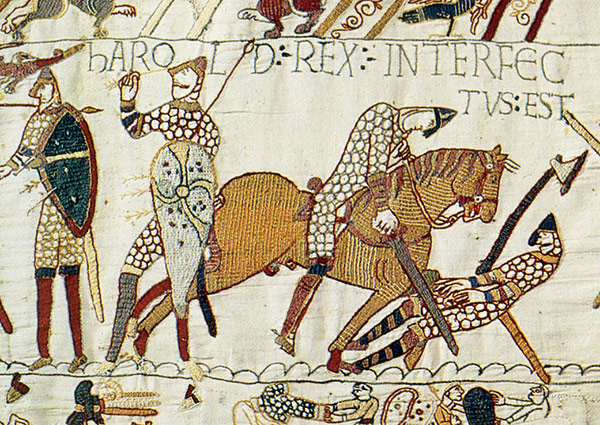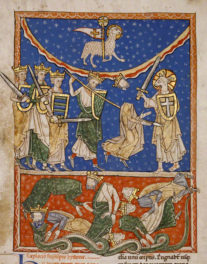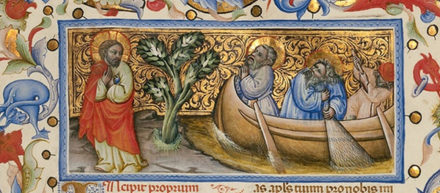
Detail of the Bayeux Tapestry showing the slaying of Harold II, England’s last Anglo-Saxon king. The embroidered words read (in Latin) “Harold rex interfectus est” (Harold the king is killed).
October 14 marks the anniversary of the Battle of Hastings, the bloody fight that sealed the deal on the Norman Conquest. In case your history is a little rusty, the Norman Conquest was the takeover of England in 1066 by invaders from northern France led by William I, better known as William the Conqueror.
William’s capture of the English crown from Harold II was a turning point for history, politics, literature, and art—but also for language. It began the transformation of English from an orderly Germanic tongue into the sprawling, messy hybrid we speak today. In short, the Battle of Hastings is the reason we talk funny.
After the Conquest, Saxon aristocrats were killed or driven off their lands, which were handed over to Norman barons. While 90+ percent of the population—the peasants—continued to speak English, their fancy new lords spoke French. For 300 years after the Battle of Hastings, French was the language of England’s kings and courtiers, landowners and officials. Latin was also a major player, serving as the language of diplomacy, philosophy, and theology. Where written language was concerned, English came in a distant third.
This helps explain why most manuscripts created in England after the Norman Conquest, such as the St. Albans Psalter (which was featured in the exhibition Canterbury and St. Albans: Treasures from Church and Cloister), are written not in English, but in French and Latin.

Scenes from the Life of Saint Alexis in the St. Albans Psalter, about 1130, Alexis Master. Tempera and gold on parchment, 12 3/16 x 8 5/8 in. Dombibliothek Hildesheim. The writing is in French.
The influence wasn’t all one way, of course. While the English “were adopting French as a language of refinement and prestige,” said Geoff Rector, a scholar of medieval literature, “the Normans were adopting the literary traditions of the English—writing histories, saints’ lives, and biblical translations in French.”
Precisely because French was the language of prestige and power, it’s no surprise that the Saxons soaked up some 10,000 loans: air, beauty, color, feast, flower, soil, story. Many of the new words reflect the elite status of the Normans: duke, countess, noble, baron, throne. Also notably: servant.
In most cases, these Frenchy words were ones English speakers already had perfectly good names for. The Saxons had a word for “wood thing you sit on,” but the French chaiere came in anyway, joining our native word for chair, stol, which eventually became stool. Have you ever wondered why veal isn’t just called calf, or why we say mutton instead of “sheepsmeat”? Simple: the words for the foods come from Old French, while the words for the animals (tended by Saxon rustics) stem from Old English.
At its core English remained a Germanic language, a close sibling to the dialects that would evolve into modern sister languages such as German, Dutch, and Danish. But in its vocabulary, it became a multi-headed hybrid. By 1400, in fact, about one in five words in English were of French origin.
This medieval franglais also primed Middle and Modern English to soak up yet more words from French, and from hundreds of other languages, a trend that continues to this day. It’s this shameless borrowing that gives English such a surfeit of evocative synonyms: cease and stop, battle and fight, feeling and emotion. English is still characterized by great openness to the new—we’ll take a good word any way we can borrow, steal, or invent it.
Today, only about a third of the words on an average book page go back to Old English, the tongue of King Harold who died on October 14, 1066. Purists like to complain about foreign and made-up words polluting “correct” English, but it’s been happening since the language came on the scene 1,500 years ago. So in a way, we have the Norman Conquest to thank for squee, selfie, srsly, and all the other fabulous, crazy new words that keep English vibrant and alive.




I wholeheartedly support the use of “squee.” Great post!
Srsly [geek-chic emoji]. Thanks Ali!
Fun and informative post Annelisa! One of my favortie books on the topic, especially since English isn’t my first language (so very hard to learn!) is Bill Brysons’ “The Mother Tongue – English And How It Got That Way.” It too has a lot of interesting anecdotes about how/why some words have come down to us (for example the silent “p”s in psychology and pneumonia).
Thanks Veronica! That’s a great book, one of my favorites also. English spelling is one of the hardest things to learn—they say there are 14 ways to write the sh sound, for starters.
Another great book for people who want to get a teensy bit more geeky with linguistics is Minkova and Stockwell’s English Words: History and Structure. Professor Minkova teaches at UCLA (full disclosure: she was my Old English teacher) and English is not her first language either, yet she is one of the world’s experts on the language.
Thoroughly enjoyable post – thanks!
fascinating post! I love words and their derivations, do crossword puzzles. Each time I think of Stella K. who came from Latvia knowing no English and how confusing the variant spellings, sounds and uses of many of “our” words were to her. She conquered them all!
English is corrupt. I use my Web writings to restore English to what God intended. We should not say “whatnot”; we should say “wotnot”. Netizens should stop using words like “bespoke” or “Manichean” that nobody can remember the meaning of. Medical personnel should stop trying to push words adopted from Latin into false plurals. You may have one “virus”, but its plural is not “viri” (men); its plural is “viruses” in English. A bedsore may be called a “decubitus” in Latin, but the plural is “decubitus” again, not “decubiti.” Harumph! Call me a curmudgeon, but speak correctly when you do so.
Another amusing element is that in England we complain about Americanisms and yet many American phrases and use of language dates from 200+ years ago and so is perhaps more correct? (Although we cannot forgive “Aloooominum” as opposed to “Al-You-Minium”)
Indeed! Though, I have to pedantically point out that older forms of a language or a word aren’t more “correct” than newer forms. From a linguistics point of view, there is no correct and incorrect, only what is said and used and what isn’t. Linguistics is a descriptive—unlike editing, which is prescriptive. That said, “aluminium” is clearly wrong 🙂
If the people in power spoke French, and the peasants seemingly spoke “English” or what was to become English, how did that happen? shouldn’t we all be speaking French or was there another historic event that killed off the use of French?
This is such an interesting question. After all, England had switched languages just a few centuries before, when conquering Anglo-Saxon (Germanic) displaced the native Celtic. So why didn’t it happen again? French was indeed the “prestige language” in England, so it seems like it should have had a pretty good chance of displacing English. Languages displace other languages for a whole complex, messy glob of factors, but a key factor at play in this case was simple numbers. There weren’t all that many French speakers in England (estimates are in the tens of thousands, vs. a few million English-speaking peasants). The two linguistic cultures didn’t actually come in that much contact. French was a language of kings and nobles, but never of the people.
This same question bothered me when I started reading English history. It turns out that both languages existed in England for a while and eventually the French aristocrats were assimilated into English culture.